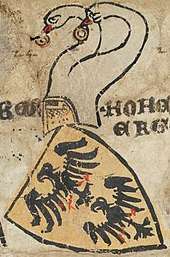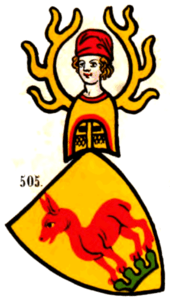House of Homberg
The House of Homberg (also spelled Honberg, historically Hochinberc, Hochenberg; also Thierstein, Tierstein) was a noble family of medieval Switzerland; they had the title of count from late 11th to early 16th century. They ruled over much of what is now northwestern Switzerland, including parts of the cantons of Aargau, Berne, Solothurn and Basel-Country.


The first count of Thierstein (alternatively, of Homberg) was Rudolf de Dierstein, mentioned 1082. The two names are taken from two castles in Rudolf's possession, both located near Frick, Aargau. The Thierstein and Homberg lines separated in 1149. The Homberg line was extinct in 1223 with the death of Werner III and their territories were acquired by marriage Hermann IV of the House of Frohburg, whose line is also known as Frohburg-Homberg. Hermann's son Friedrich took the title of count of Homberg and built the castle Neu-Homberg in what is now part of the canton of Basel-Country. One of Friedrich's sons was Wernher von Homberg, one of the minnesingers featured in Codex Manesse.
The ancestral castles of Thierstein and Homberg were both destroyed in the earthquake of 1356, and the Thierstein branch of the family now renamed a castle of theirs near Büsserach (in what is now known as the Thierstein District of the canton of Solothurn) to Neu-Thierstein. In 1330, a branch of the Thierstein family, known as Thierstein-Farnsburg, built Farnsburg castle near Ormalingen. They were given Sisgau as a fief from the bishop of Basel. Count Oswald von Thierstein in 1479 received Hohkönigsburg in the Alsace as fief from emperor Frederick III. The Thierstein family was extinct in 1517, after which Hohkönigsburg fell back to the House of Habsburg.
Counts of Thierstein and Homberg
House of Thierstein
| Ruler | Born | Reign | Death | Ruling part | Consort | Notes | |
|---|---|---|---|---|---|---|---|
| Rudolf I | ? | c.1020-1048 | After 1 June 1048[1] | County of Thierstein | Unknown at least one child |
First documented count of the family, in Sisgau. | |
| Rudolf II[2] | ? | c.1048-1103 | c.1103[2] | County of Thierstein | Unknown one or two children |
Cited also as Advocatus in 1098[2]. | |
| Rudolf III | ? | c.1103-1114 | After 7 March 1114[1] | County of Thierstein | Ita of Habsburg three children |
Cited as Count of Thierstein and Homberg. His sons divided his patrimony. | |
| Werner I | ? | c.1114-1141/54[2] | After 13 April 1141[1] or after 1154[2] | Thierstein-Homberg | A lady Zollern four children |
Son of Rudolf III, inherited the county of Homberg. | |
| Rudolf IV | ? | c.1114-1144/7[2] | After 8 July 1144[1]or c.1147[2] | County of Thierstein | Unknown at least one child |
Son of Rudolf III, inherited the remaining Thierstein. | |
| Rudolf V | ? | c.1144/7-1179?[1] | before 1180[1] | County of Thierstein | Bertha of Sogren four children |
||
| Werner II | ? | c.1141/54-1185 | After 1185[1][2] | Thierstein-Homberg | Unknown two children |
||
| Rudolf VI/ V[1] | ? | c.1179?-1238[2] | c.1238[2] | County of Thierstein | Gepa[2] three children |
||
| Werner III | ? | c.1185-1223 | 25 May 1223[1] | Thierstein-Homberg | Unknown no children |
Last male membr of the Homberg branch Through a sister or a daughter, who married Herman IV, Count of Frohburg. The land was inherited by the House of Frohburg. | |
| Rudolf VII/ VI[1] | ? | c.1238-1262[1] | After 24 August 1262[2] | County of Thierstein | Sophia[2] four children |
||
| Sigismund I | ? | c.1262-1326[1] | 4 May 1326[1] | Thierstein-Farnsburg | Agnes of Weissenburg (d. after 1334) three children |
Son of Rudolf VII/VI, inherited Farnsburg. | |
| Rudolf VIII/ VII[1] | ? | c.1262-1318[1] | 27 August 1318[1] | Thierstein-Pfeffingen | Beatrix one child Elisabeth [Adelheid] of Hohenklingen (d. 16 January 1316/23) two children |
Son of Rudolf VII/VI, inherited Pfeffingen. | |
| Ulrich I/ II[1] | ? | 1318-c.1330[1] | before 29 June 1330[1] | Thierstein-Pfeffingen | Unknown two children |
||
| Otto I | ? | 1326-1347/52 | 1347/52[1] | Thierstein-Farnsburg | Clementina of Usenberg (d. after 1352) one child |
||
| Walram I/ II[1] | ? | 1330-1345/56 | 2 October 1345/56[1] | Thierstein-Pfeffingen | Agnes of Neuchâtel-Arberg October 1320[3] two children |
||
| Sigismund II | ? | 1347/52-1383 | October 1383[1] | Thierstein-Farnsburg | Verena of Neuchâtel-Nidau (d. after 1384) four children |
||
| Walram II/ III[1] | before 1339 | 1345/56-1403 | 22 May 1403[1] | Thierstein-Pfeffingen | Anna of Fürstenberg[1] or Adelheid of Hohenlohe four children Gisela Malterer[1] (morganatic?) no children |
||
| Walram III/ IV[1] | before 1375 | c.1375-1386 | 9 July 1386[1] | Thierstein-Pfeffingen | Adelaide of Baden (d. 19 July 1370 or 31 December 1373)[1] before 4 April 1369[1] four children |
Possibly co-ruled with his father, as he predeceased him. | |
| Otto II | before 1375 | 1383-1418 | 1418 | Thierstein-Farnsburg | Unmarried | Sons of Sigismund II, probably ruled jointly. After their deaths with no male descendants, this line became extinct. | |
| Herman I | before 1375 | 1383-1405 | 17 June 1405[1] | Thierstein-Farnsburg | Agnes of Mätsch (d. 1421) before 28 April 1393[1] one child | ||
| Sigismund III | before 1375 | 1383-1388 | 1388 | Thierstein-Farnsburg | Unmarried | ||
| Bernard I | ? | 1403-1437 | 13 December 1437[1] | Thierstein-Pfeffingen | Ita of Toggenburg (d. before 20 June 1414)[1] two children Henriette de Blâmont c.1417 one child |
||
| John I/ II[1] | ? | 1403/37-1455 | 1455 | Thierstein-Pfeffingen | Unknown three children |
Co-ruled with or succeeded his brother. | |
| Oswald I | before 1339 | 1455-1488 | 26 March or 6 September 1488[1] | Thierstein-Pfeffingen | Ottilie of Nassau-Dillenburg before 13 January 1471 two children |
||
| Henry | before 1339 | 1488-1519 | 30 November 1519[1] | Thierstein-Pfeffingen | Margaret of Neufchâtel-Bourgogne (d. after 5 December 1533) two children |
Sons of Oswald I, probably ruled jointly. | |
| Oswald II | before 1339 | 1488-1512 | 27 August 1512[1] | Thierstein-Pfeffingen | Elisabeth of Löwenstein (d. after 1510) two children | ||
See also
References
- Cawley 2001.
- Birmann 1879, p. 133.
- Marriage contract from 11 October. Cf. Cawley 2001
Bibliography
- Cawley, Charles (2001), Medieval Lands - Foundation for Medieval Genealogy, Grafen von Thierstein, fmg.ac
- Birmann, Martin, Die Genealogie der Grafen von Thierstein und Honberg , Basel, 1879, pp.102-136
- Hälg-Steffen, Franziska: Homberg, von in German, French and Italian in the online Historical Dictionary of Switzerland.